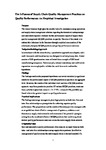The Influence of Supply Chain Quality Management Practices on Quality Performance: An empirical investigation
| dc.contributor.author | Soares, A | en |
| dc.contributor.author | Soltani, E | en |
| dc.contributor.author | Liao, Y | en |
| dc.date.accessioned | 2017-06-29T15:25:06Z | |
| dc.date.issued | 2017-06 | en |
| dc.identifier.uri | http://hdl.handle.net/10026.1/9567 | |
| dc.description.abstract |
Purpose The extant literature highlights the notable lack of a consensus among operations and supply chain management scholars regarding the theoretical underpinnings and associated empirical evidence for the performance impact of supply chain quality management (SCQM) practices on quality. The purpose of this paper is to redress this imbalance in the literature through empirical examination of the relationship between SCQM practices and quality performance outcomes. Design/methodology/approach In accordance with the research aim, a quantitative approach was adopted, and a multi-item scale Web-based survey was designed to collect primary data. A total number of 325 questionnaires were collected from a sample of UK-based manufacturing companies. Factor analysis, internal consistency and multivariate regressions were used to validate the multi-item scale and test the hypotheses. Findings The findings confirm the proposed hypotheses and reveal statistically significant results for the performance impact of SCQM practices on quality at an aggregate level. However, the results of the individual level analysis of SCQM practices appear to vary from practice to practice. Of various SCQM practices, customer focus with the highest beta value (i.e. ß = 0.303; t-value = 6.120; p = 0.000) was found to have the greatest impact on quality performance. Practical implications The findings encourage managers to place high priority on both inter-firm and intra-firm relationships as prerequisites for achieving superior quality performance. The propositions and the results of the study provide managers with some guidelines about effective management of upstream, midstream and downstream supply chain networks and awareness of the potential synergies arising from the combined effects of SCQM practices that could bring about desired quality performance outcomes across the entire supply chain network. Originality/value Real and sustainable quality performance often requires an equal focus on both intra- and inter-firm relationships among supply chain partners. Therefore, effective management of quality across the entire supply chain is deemed essential if a firm is to smoothly supply high-quality products and services to customers. But little research has been devoted to understanding conceptual underpinnings of SCQM as well as empirical support and validation for the conceptualisation and measurement of SCQM practices. Based on the insights gained from social network theory, this paper makes an attempt to address this gap and examine the impact of SCQM practices on quality performance. | en |
| dc.format.extent | 122 - 144 | en |
| dc.language.iso | en | en |
| dc.subject | Performance | en |
| dc.subject | Quality management | |
| dc.subject | Surveys | |
| dc.subject | Supply-chain management | |
| dc.title | The Influence of Supply Chain Quality Management Practices on Quality Performance: An empirical investigation | en |
| dc.type | Journal Article | |
| plymouth.issue | 2 | en |
| plymouth.volume | 22 | en |
| plymouth.publication-status | Published | en |
| plymouth.journal | Supply Chain Management: an International Journal | en |
| dc.identifier.doi | 10.1108/SCM-08-2016-0286 | en |
| plymouth.organisational-group | /Plymouth | |
| plymouth.organisational-group | /Plymouth/REF 2021 Researchers by UoA | |
| plymouth.organisational-group | /Plymouth/REF 2021 Researchers by UoA/UoA17 Business and Management Studies | |
| dcterms.dateAccepted | 2017-04-05 | en |
| dc.rights.embargodate | 2019-06-01 | en |
| dc.rights.embargoperiod | 24 months | en |
| rioxxterms.versionofrecord | 10.1108/SCM-08-2016-0286 | en |
| rioxxterms.licenseref.uri | http://www.rioxx.net/licenses/under-embargo-all-rights-reserved | en |
| rioxxterms.licenseref.startdate | 2017-06 | en |
| rioxxterms.type | Journal Article/Review | en |


